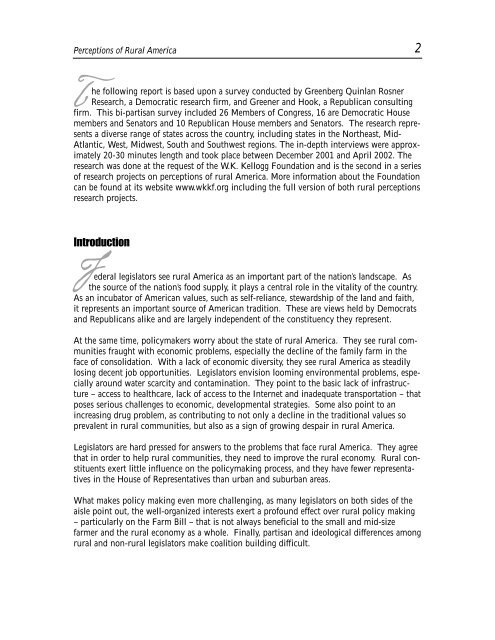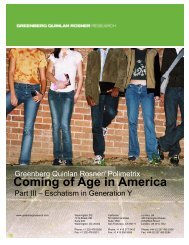803_Congressional Perspectives.pdf - Greenberg Quinlan Rosner
803_Congressional Perspectives.pdf - Greenberg Quinlan Rosner
803_Congressional Perspectives.pdf - Greenberg Quinlan Rosner
- No tags were found...
Create successful ePaper yourself
Turn your PDF publications into a flip-book with our unique Google optimized e-Paper software.
Perceptions of Rural America2The following report is based upon a survey conducted by <strong>Greenberg</strong> <strong>Quinlan</strong> <strong>Rosner</strong>Research, a Democratic research firm, and Greener and Hook, a Republican consultingfirm. This bi-partisan survey included 26 Members of Congress, 16 are Democratic Housemembers and Senators and 10 Republican House members and Senators. The research representsa diverse range of states across the country, including states in the Northeast, Mid-Atlantic, West, Midwest, South and Southwest regions. The in-depth interviews were approximately20-30 minutes length and took place between December 2001 and April 2002. Theresearch was done at the request of the W.K. Kellogg Foundation and is the second in a seriesof research projects on perceptions of rural America. More information about the Foundationcan be found at its website www.wkkf.org including the full version of both rural perceptionsresearch projects.IntroductionFederal legislators see rural America as an important part of the nation’s landscape. Asthe source of the nation’s food supply, it plays a central role in the vitality of the country.As an incubator of American values, such as self-reliance, stewardship of the land and faith,it represents an important source of American tradition. These are views held by Democratsand Republicans alike and are largely independent of the constituency they represent.At the same time, policymakers worry about the state of rural America. They see rural communitiesfraught with economic problems, especially the decline of the family farm in theface of consolidation. With a lack of economic diversity, they see rural America as steadilylosing decent job opportunities. Legislators envision looming environmental problems, especiallyaround water scarcity and contamination. They point to the basic lack of infrastructure– access to healthcare, lack of access to the Internet and inadequate transportation – thatposes serious challenges to economic, developmental strategies. Some also point to anincreasing drug problem, as contributing to not only a decline in the traditional values soprevalent in rural communities, but also as a sign of growing despair in rural America.Legislators are hard pressed for answers to the problems that face rural America. They agreethat in order to help rural communities, they need to improve the rural economy. Rural constituentsexert little influence on the policymaking process, and they have fewer representativesin the House of Representatives than urban and suburban areas.What makes policy making even more challenging, as many legislators on both sides of theaisle point out, the well-organized interests exert a profound effect over rural policy making– particularly on the Farm Bill – that is not always beneficial to the small and mid-sizefarmer and the rural economy as a whole. Finally, partisan and ideological differences amongrural and non-rural legislators make coalition building difficult.




